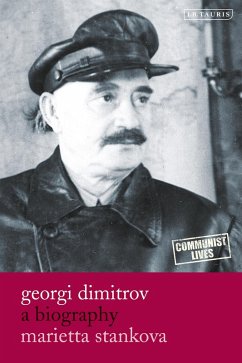Georgi Dimitrov burst onto the international scene in 1933 as one of the Comintern operatives in Germany accused of the Reichstag fire. The Bulgarian Communist's spirited self-defence in the resulting Leipzig Trial made him a celebrity among Communists worldwide - particularly in the Soviet Union, where he became Secretary General of the Comintern after his acquittal. Popular opinion holds that this 'whirlwind', who defied Goering and the Nazis in full view of the world, subsequently became little more than a rubber stamp for Stalin. This lucid and fascinating biography - the first in English - reveals a more multifaceted treatment of Dimitrov, highlighting especially the deep complexity of his relationships with his two greatest political allies: Stalin and Tito.
With unique authority drawn from extensive archival research, Marietta Stankova strips away decades of conventional wisdom to reveal Georgi Dimitrov in all his roles: as labour agitator, Leipzig Trial icon, loyal Stalinist and Pan-Balkan visionary. Dimitrov entered radical politics at an early age and was a central figure in the formation of the Bulgarian Communist Party in 1919. A failed uprising forced him into exile and brought him in disfavour in his Party - which he counteracted through loyal inconspicuous service at the Comintern, where he was eventually put in charge of the Western European section. Following his spectacular clash with the Nazis in the Leipzig Trial, Dimitrov was appointed General Secretary of the Comintern. In this post, Dimitrov was Communism's ambassador to dissidents and radicals the world over. At the same time, he was deeply implicated in the Soviet political purges of the latter 1930s. Through these he also consolidated his leadership of his native Party but it was only in 1946, two years after the Bulgarian communists had seized power in the wake of World War II, that he was sent home to lead the new Bulgarian Communist government. Working against ill health and Stalin's often unpredictable behaviour, he remained committed to the establishment of Communism in Bulgaria and to upholding Soviet interests, even if this meant the destruction of one of his lifelong aspirations, a Balkan Federation.
Using new and unpublished sources, Stankova brilliantly reconstructs the dilemmas that Dimitrov faced throughout his long and varied political career. This definitive and long-overdue biography makes a major contribution to the history of Bulgaria and of the Balkans as a whole, as well as to the field of Communist Studies.
With unique authority drawn from extensive archival research, Marietta Stankova strips away decades of conventional wisdom to reveal Georgi Dimitrov in all his roles: as labour agitator, Leipzig Trial icon, loyal Stalinist and Pan-Balkan visionary. Dimitrov entered radical politics at an early age and was a central figure in the formation of the Bulgarian Communist Party in 1919. A failed uprising forced him into exile and brought him in disfavour in his Party - which he counteracted through loyal inconspicuous service at the Comintern, where he was eventually put in charge of the Western European section. Following his spectacular clash with the Nazis in the Leipzig Trial, Dimitrov was appointed General Secretary of the Comintern. In this post, Dimitrov was Communism's ambassador to dissidents and radicals the world over. At the same time, he was deeply implicated in the Soviet political purges of the latter 1930s. Through these he also consolidated his leadership of his native Party but it was only in 1946, two years after the Bulgarian communists had seized power in the wake of World War II, that he was sent home to lead the new Bulgarian Communist government. Working against ill health and Stalin's often unpredictable behaviour, he remained committed to the establishment of Communism in Bulgaria and to upholding Soviet interests, even if this meant the destruction of one of his lifelong aspirations, a Balkan Federation.
Using new and unpublished sources, Stankova brilliantly reconstructs the dilemmas that Dimitrov faced throughout his long and varied political career. This definitive and long-overdue biography makes a major contribution to the history of Bulgaria and of the Balkans as a whole, as well as to the field of Communist Studies.









